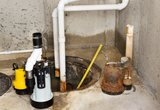Discover When & Why to Upgrade Your Pool Pump with This Expert Guide
0 comments
Upgrading your pool pump can greatly enhance your swimming pool experience by improving efficiency, reducing costs, and ensuring cleaner pool water. This guide will help you identify when it's time to replace your pool pump and provide insights into choosing the best replacement.
1. Signs Your Pool Pump Needs Replacement
Recognizing the tell-tale signs of a failing pool pump is crucial for maintaining your pool's health. Common indicators include low pressure, which can signify an ageing or malfunctioning pump, and strange noises like grinding or screeching that indicate internal damage. Frequent repairs can also be a red flag that it's time for a replacement. If you're constantly fixing your pump, investing in a new one may be more cost-effective. High or rising energy bills can also signal that your older pump is less efficient, leading to higher electricity costs.
2. Benefits of Upgrading Your Pool Pump
Upgrading to a newer pool pump model offers several advantages. Enhanced efficiency is a key benefit, as modern pool pumps consume less energy, leading to significant savings. Improved filtration is another advantage; advanced pool filtration systems, such as sand filters and cartridge filters, remove dirt and impurities more effectively. Newer pumps also operate more quietly, ensuring a more peaceful pool environment. They are designed with durability in mind and require less maintenance over time.
3. Types of Pool Pumps: Which One to Choose
Different types of pool pumps are designed to meet various needs. Single-speed pumps are the most common and affordable but are less energy-efficient. Variable-speed pumps offer adjustable speeds for better energy efficiency and performance, and this makes them a popular choice for many pool owners. Dual-speed pumps provide two-speed settings, balancing cost and efficiency. Booster pumps are ideal for pools with pressure-side cleaners.
4. How to Choose the Right Replacement Pool Pump
Selecting the right pool pump involves considering several factors. First, ensure the pump's flow rate matches your pool's volume. Energy efficiency is another crucial factor; look for models with high energy ratings. Compatibility with your existing pool filtration system is essential to ensure seamless integration. Opt for reputable hardy brands known for quality and durability, and consider local conditions like climate and pool usage frequency when making your choice.
5. Installation Tips for Your New Pool Pump
Proper installation is key to maximising your new pool pump's performance. Begin by carefully reading the manufacturer's instructions. Ensure all connections are secure and leak-free. Before starting the pump, prime it to remove air from the system. Finally, run the pump and check for any issues to confirm it's working correctly.
6. Maintenance Tips to Extend the Life of Your Pool Pump
Regular maintenance is most important for keeping your pool pump in top condition. Clean or replace cartridge filters and sand filters regularly to ensure efficient operation. Monitor the pressure gauge to maintain optimal performance and inspect the pump for signs of wear and tear, addressing any issues promptly. Keep the area around the pump clean to prevent blockages from dirt and debris.
Frequently Asked Questions
Q1. What size pump do I need for my swimming pool?
A1. The pump size depends on your pool's volume and the desired turnover rate. Professionals like our team at A1 Pumps & Motors can help determine the correct pump size according to your specific needs.
Q2. What is the life expectancy of a pool pump?
A2. A well-maintained pool pump can last between 8 and 15 years, depending on usage and conditions.
Q3. How many hours a day should a pool pump run?
A3. Typically, a pool pump should run 8-12 hours daily to ensure proper filtration and water quality.
Q4. What are the three types of pool pumps?
A4. The three main types, and most common pool pumps are single-speed, dual-speed, and variable-speed pumps.
Upgrading your pool pump is a smart investment that can improve efficiency, reduce costs, and enhance your overall pool experience. By understanding the signs of a failing pump, the benefits of newer models, and how to choose the right replacement, you can make informed decisions that will keep your pool in optimal condition.
Ready to upgrade your pool pump? Contact A1 Pumps & Motors today to explore our range of high-quality pool pumps and find the perfect solution for your swimming pool needs. Our team of experts is here to help you every step of the way!



0 comments